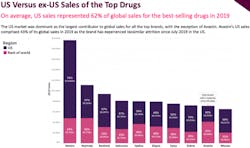Earlier this year, Informa Pharma Intelligence released a report highlighting the top 10 selling drugs of 2019.
Although the list includes many of the same drugs from recent years, there has been movement among the blockbusters — with some drugs gaining ground, and other slowly dropping down the list.
Here’s a look at some of the key takeaways from Informa Pharma Intelligence’s report, “Top 10 best-selling drugs of 2019.”
Pharma's top 10 best-selling drugs of 2019
1. Humira — $19.6 billion
(AbbVie, Eisai)
2. Keytruda — $11.1 billion
(Merck & Co.)
3. Revlimid — $9.4 billion
(Bristol Myers Squibb, Celgene)
4. Imbruvica — $8.1 billion
(AbbVie, Johnson & Johnson)
5. Opdivo — $8 billion
(Bristol Myers Squibb, Ono Pharmaceutical)
6. Eliquis — $7.9 billion
(Bristol Myers Squibb)
7. Eylea — $7.5 billion
(Regeneron)
8. Enbrel — $7.2 billion
(Amgen, Pfizer, Takeda)
9. Avastin — $7.1 billion
(Roche)
10. Rituxan — $6.5 billion
(Roche)
Source: Informa Pharma Intelligence
Humira is still on top — by a lot
AbbVie’s immunosuppressive for psoriasis, arthritis, Crohn’s disease and more, is still the industry’s heavyweight champ. In fact, its $19.6 billion in sales is worth 21 percent of the top 10’s total sales.
Humira is also the only drug on this list that didn’t move from 2018, as it continues to defend its top spot.
Keytruda is gaining ground
Between 2018 and 2019, Keytruda jumped from the No. 6 position on the best-selling list to No. 2.
“Keytruda experienced the greatest sales growth [among the top 10] from 2018 to 2019 at a marked 54.6 percent increase in global sales,” says Stephanie Yip, senior analyst, Datamonitor Healthcare, and author of the report.
Informa Pharma Intelligence predicts that Merck’s Keytruda, a PD-1 inhibitor indicated to treat several forms of cancer, will not only top this list within the next five years, but that it will start pulling in more than $20 billion in annual sales, which could put it on track to become the best-selling drug of all time.
Imbruvica made the biggest moves
AbbVie’s oncology treatment wasn’t even on the list in 2018. But in 2019 it shot up to the No. 4 spot.
“It really made a splash in 2019 by increasing the most places out of all the brands,” Yip says.
This is probably Rituxan’s last year on the list
“Rituxan already held last place in the top 10 best-selling drugs of 2019 and had fallen two places from the previous year, as it is on a negative sales trajectory,” Yip says of Roche’s treatment for cancer and arthritis.
“Since its biosimilars first launched in the U.S. from the end of 2019 (November), the effects of biosimilar erosion will be ramping up through 2020.”
Source: Informa Pharma Intelligence
Generic competition is shaking up the list
All of the top drugs will face generic or biosimilar competition in the next 10 years. Biosimilars for Avastin and Rituxan hit the market in 2019 and sales for both blockbusters suffered. And by 2023, generic competition is coming for Revlimid, Humira and Eylea, which is likely to shake up the rankings.
“It's likely that Humira will continue its stronghold at first place until the launch of several biosimilars in the U.S. in quick succession during 2023,” Yip says.
Cancer is still king
Six of the best-selling drugs can be taken for oncology indications, making it the most-targeted therapeutic area.
The second-most targeted field is autoimmune/immunology — an area indicated by four of the drugs on the list.
Although some of the biggest blockbusters have been approved for several indication areas — a strategy that can help lift a drug’s sales — six are still mainly used for one major indication. The best-selling drugs with the broadest reach — Humira and Rituxan — are mainly used for select indications.
The U.S. is still the biggest market
About 62 percent of the total sales for the top 10 drugs were in the U.S. Only one drug — Roche’s chemotherapy treatment Avastin — had a larger portion of its sales outside of the U.S.
Source: Informa Pharma Intelligence
Blockbusters can rule a company’s portfolio
Bristol Myers Squibb has the most drugs (three) on the list — Eliquis, Opdivo and Revlimid. Those three drugs alone accounted for a whopping 63 percent of the company’s 2019 revenue.
Price hikes are boosting sales figures
Only three drugs on the list — Eylea, Avastin and Rituxan — did not experience a price increase in 2019. The price for every other drug was raised once — except for Opdivo, which was increased twice. Of all the drugs, the average wholesale price for Humira was jacked up the most — 7.4 percent.


